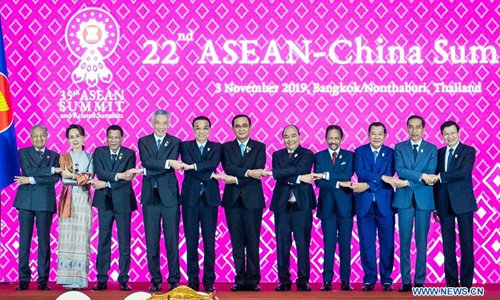HOME >> OPINION
Better China-ASEAN ties unlikely to be hit by US bid to influence bloc members
Source:Global Times Published: 2019/11/6 17:23:40

Chinese Premier Li Keqiang (5th L) poses for a group photo with other leaders at the 22nd China-ASEAN (10+1) leaders' meeting in Bangkok, Thailand, Nov. 3, 2019. (Xinhua/Zhai Jianlan)
US President Donald Trump's absence from the 35th ASEAN Summit and Related Summits is not the first time Washington has shown lack of enthusiasm for the regional meeting that involves countries with half the global population.
Then US President George W. Bush had cancelled his trip to ASEAN Summit in Singapore in 2007, which the US described as "benign neglect."
As a crucial trade partner of the bloc, the US sent to the summits held in Bangkok from November 2 to 4 a delegation that was an obvious watering down of what could have been a high-level presence. Washington was represented by a team made up of US Commerce Secretary Wilbur Ross and national security adviser Robert O'Brien.
In addition to the trouble over domestic issues, Trump may deliberately neglect ASEAN. Since taking office, he has been cranking up the "America First" policy and his fervor to go unilateral is not in line with the ASEAN history that focuses on multilateralism, connectivity and regional cooperation. Trump may regard attending ASEAN summit as a waste of time, but he had to send a delegation as Washington has its interests in Southeast Asia.
Among Southeast Asian countries, the Philippines and Thailand have been allies of the US. Singapore has maintained close ties with the US, especially in security; the strategy of other countries is to strike a balance of power with the US. Malaysian Prime Minister Mahathir Mohamad called for ASEAN on Saturday to unite against the West's protectionism. His words indicate he stood on the side of the interests of the majority of people in the world.
US-ASEAN ties are complicated. Overall, ASEAN members have kept good relations with the US, but the two sides also have contradictions, such as on human rights and trade issues. Without properly tackling these divergences, US-ASEAN ties would suffer.
Washington's repeated meddling in the South China Sea betrays its anxiety about being marginalized or neglected in the region. China and ASEAN members are negotiating the Code of Conduct (COC). Washington hopes to impose its influence on COC negotiation by ratcheting up its presence in the South China Sea, such as increasing the number of warships sailing in the sea. The US intention to unite ASEAN against China would be difficult to realize, because bloc countries are reluctant to pick sides between the two giants.
Chinese Premier Li Keqiang said at the 22nd China-ASEAN (10+1) leaders' meeting in Thailand on Sunday that he hopes all sides will carry forward consultations on the COC related to the South China Sea according to the previously agreed timetable and called on all sides to uphold peace, friendship, and cooperation and safeguard lasting peace and stability in the region.
China has exercised great restraint on the South China Sea issue, revealing Beijing's good intention and sincerity. Despite being the largest country in the region, China has been sincerely trying to resolve the issue through talks with ASEAN, instead of resorting to bullying. Proposing the schedule of COC negotiations and engaging in "setting aside dispute and pursuing joint development" embodies China's pursuit of the path of peaceful development as a rising power dedicated to peace.
The upgraded protocol of China-ASEAN Free Trade Agreement took effect on October 22, which would further show the potential benefits of the free trade area. Negotiations on the Regional Comprehensive Economic Partnership have made a major breakthrough. The relationship between China and ASEAN is the most dynamic, substantial and productive one in the Asia-Pacific region. China-ASEAN cooperation mechanism has set a model for other countries in several spheres.
China has been the largest trading partner of ASEAN for 10 consecutive years. In 2018, bilateral trade between China and ASEAN hit $580 billion and mutual investment reached over $200 billion. These figures show cooperation between China and the bloc is highly effective, setting a good example for other countries.
China-ASEAN relations have entered a new stage of all-round development. Li said in 2017 that China-ASEAN cooperation framework would upgrade to 3+X, touching many fields while focusing on political security, economy and trade, and people-to-people contacts. Deeper cooperation in digital economy, artificial intelligence, big data and cyber security is also expected.
The China-ASEAN Strategic Partnership Vision 2030 issued in 2018 lays out a promising blueprint for the future development of ties. In spite of the huge scale, ways to improve the quality and standard of cooperation will be explored.
The article was compiled by Global Times reporter Lu Yuanzhi based on an interview with Xu Liping, director of the Center for Southeast Asian Studies of the Chinese Academy of Social Sciences. opinion@globaltimes.com.cn
Posted in: VIEWPOINT,ASIAN REVIEW